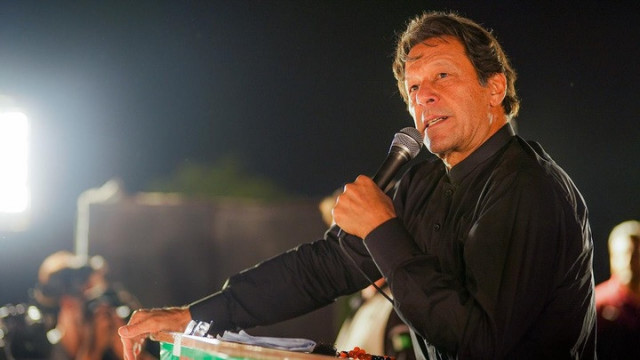The people have given their verdict in a very high stakes by-elections on 20 seats and, in a performance which has stunned both the Pakistan Muslim League-Nawaz (PML-N) and experts alike, Pakistan Tehreek-e-Insaf (PTI) has ended up winning 15 seats. In normal times, this would have not been considered a great performance as PTI apparently lost 25% of the seats it had previously won in the previous election.
However, these are not normal times as Hamza Shahbaz’s government’s survival was dependent on winning at least 10 seats, which made the stakes much higher. Secondly, and more importantly, 11 of these seats had been won by independent candidates in the 2018 elections who later joined PTI due to Jehangir Tareen’s personal efforts. In other words, these defectors had their own substantial vote bank in those constituencies and therefore it was expected that PTI would really struggle to win even a handful of these seats.
The third factor was that in 2018, the Pakistani establishment had actively supported PTI, something which was completely absent this time around. Although the establishment did not create hurdles for PTI, at the same time, the party was basically on its own and fighting an opponent on its own turf who had government machinery at its disposal.
Due to the aforementioned factors, this performance could be considered stellar and a game changer for the party, not only for its immediate prospects in Punjab but also for the next General Elections. The PTI has ended up gaining seats in a real sense. Some political commentators are right when they say that for the first time Imran Khan has truly arrived as a leader and is in a very good position to win the upcoming General Elections. Some are even projecting a two-thirds majority.
So how did this happen? I think the reasons have to do with the interplay between the existing polarisation in society, the nature of Imran’s own support base, the way he was ousted from power, and his narrative which resonated with his base. Additionally, PTI campaigned hard, leveraging its workers as well as its huge social media footprint far more effectively than PML-N. Its leadership was also more engaged than that of PML-N, which at times seemed that it was taking things for granted. Also, the timing of Imran’s ouster proved costly for the PML-N-led government because they had to take tough economic decisions which, though economically essential, proved politically damaging.
Firstly, Pakistani society for the past decade has become very politically polarised, and Imran himself has played an active role in this. When polarisation occurs, the supporters of a particular party start developing intense hatred towards other parties and consequently are more likely to actually go out and vote. PTI’s support base in any case is more like a personality cult than a political party, and therefore much more likely to vote in a polarised and politically charged atmosphere. The way Imran was removed through the no-confidence motion further increased the polarisation by bestowing upon him the status of a “lone warrior”, and allowed him to build a very effective narrative of foreign conspiracy.
This narrative, though completely baseless, allowed him to shift the focus away from glaring economic failures of his three-and-half year’s rule, and frame his core message around patriotism and religion while enabling him to paint his opponents as anti-Pakistan and foreign agents. As already stated, this narrative was baseless, but it nevertheless charged up his own base. Furthermore, to his credit, Imran and his team campaigned very hard, drawing mammoth crowds everywhere he went, whereas PML-N ran a lackluster campaign. The PML-N was also without an effective slogan as “Vote Ko Izzat Do” had now become laughably redundant because of its collaboration with the establishment. Moreover, PTI also leveraged its social media presence brilliantly and flooded various platforms, particularly Twitter, with trends like 'Imported government unaccepted', promoting the main PTI narrative of regime change incessantly. On the other hand, PML-N’s social media presence was not even remotely comparable.
Secondly, PML-N inherited the reins of government at a time when taking difficult decisions had become inevitable due to an unsustainable current account deficit. A few weeks ago, I had written that it would be better for Shahbaz Sharif to dissolve the government and let a caretaker setup take over so that difficult decisions could be taken. However, much to my surprise, the PML-N led government decided to stay and brave the storm. Initially, Shahbaz had tried his level best to avoid removing the fuel subsidy and increasing the power tariff. Due to the worsening deficit, the dollar continued to slide, raising fears that Pakistan may be heading for a Sri Lanka-like situation where a lack of foreign exchange reserves has resulted in an economic crisis.
Since the revival of the International Monetary Fund (IMF) programme was the only option in the short run, eventually it yielded and removed the fuel subsidy in three phases and also increased taxes on various necessities in the federal budget. Due to the recency effect, the public (other than the PTI support base also) forgot the inflation and economic mismanagement during Imran’s rule since the present hike in prices felt more painful. The huge increase in the cost of living ended up denting PML-N’s popularity badly and demotivated its own supporters. Since this election was taking place almost immediately after such decisions, the party ended up paying a high penalty.
So, what have we learnt from these by-elections? The first big lesson is that similar to some other countries, Pakistan is also susceptible to effective populist rhetoric by a charismatic leader given a conducive atmosphere. The ousting of Imran before his time provided him that atmosphere in which he was able to propagate his narrative in such a way that his support base got really energised and the public forgot the economic mismanagement during his government.
The second big lesson is that it is better to let a government complete its term. Had Imran been allowed to complete his term, he would have never gotten this conducive atmosphere to weave his narrative so effectively. The third big lesson is that timing matters a lot with respect to taking tough decisions. Even a sensible decision at a bad time can prove to be extremely costly in the eyes of the public. Fourthly, we must take social media very seriously as it is the most effective platform to influence young voters.
After these by-elections, PML-N has lost the majority in Punjab and, barring some exceptional development, Hamza will be removed from his post. With Punjab no longer under its control, it will become exceptionally hard for the federal government of PML-N to survive. Things are looking great for Imran and he looks set to win the elections if they are called now. I may not like what’s happening since I don’t like reactionary politicians like Imran, but I can’t deny that it is happening.



COMMENTS
Comments are moderated and generally will be posted if they are on-topic and not abusive.
For more information, please see our Comments FAQ